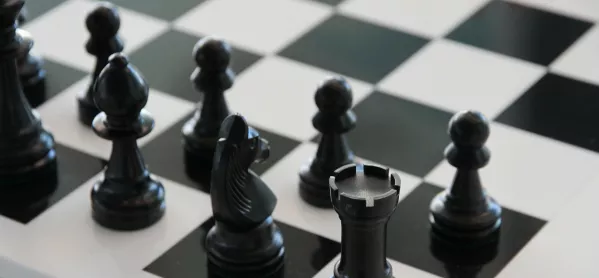Is chess a key tool for developing pupils’ strategic thinking that should be taught in every school, or just another hobby akin to collecting coins or playing the trombone?
That’s the question teachers asked themselves at the ATL union’s annual conference in Liverpool this week, where delegates clashed over whether the 1,500 year-old game should be promoted in all schools.
Fifty-six per cent of delegates voted for the ATL executive to lobby the government to “give every child the opportunity to learn how to play at school” by recognising it as a “mindsport” entitled to central funding.
Hank Roberts, who proposed the motion, said the government’s past refusal to recognise chess as a full sport was “stupid” and “completely lacking in understanding”.
He said redefining it as a “mindsport” eligible for government funding would be a “cheap and easy way to give lots and lots of kids an improvement in their thinking skills”.
Mr Roberts later told journalists that his “personal preference” would be for chess to be given the status of a full sport and made part of the national curriculum.
He insisted that the game could be “physically exhausting” and “comparable to serious physical exercise” - particularly when played at a high level.
“Personally, I think it’s of such benefit that in primary schools you should actually teach it,” he said.
‘It’s a physical sport’
Azra Haque, who seconded the motion, agreed that it could be a physically demanding exercise.
“As the stresses and tensions builds up, blood pressure builds up, too, pulse and respiration rates… increase, so it is a physical sport.”
However, not all delegates were so sure it should be promoted in all schools.
David Brown said he opposed the motion, even though his school has a “thriving and successful chess club”.
“This motion asks our executive committee to ask the government to seek to give every child the opportunity to learn how to play chess at school,” he said.
“Really? What are they going to do, rewrite the national curriculum?
“How many other pet subjects could have occupied this space on our agenda? What about hockey or coin collecting or playing the trombone?”
Mr Brown said this “very personal request to extend the school curriculum” was “rather like Michael Gove telling us that we must teach children about Florence Nightingale and Admiral Nelson”.
“Let schools and their teachers decide how and whether they might introduce it for their young people. Do we really want even more prescription from central government?” he said.
Emma Parker argued that carving out a special role for chess in schools would exacerbate the funding and workload crises.
“I know of schools which are struggling to buy pencils, gluesticks and textbooks,” she said, “but now we’re talking about chess sets.”
“For children to learn how to play chess, someone’s going to learn how to teach them. In the struggling workload of a teacher and support staff, this is going to be passed down.”
Want to keep up with the latest education news and opinion? Follow Tes on Twitter and like Tes on Facebook




